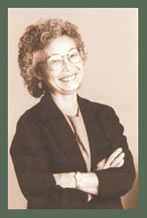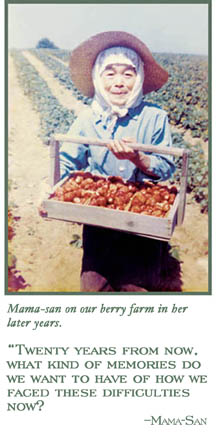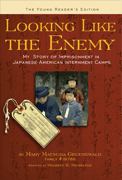
 |
 |
 |
 |
 |
 |
Young Reader's Edition |
|
ISBN 978-0-939165-58-2 |
![]()
MY STATEMENT FOR THESE TIMES
Then and Now: Don't Let It Happen Again
© 2008 by Mary Matsuda Gruenewald
© 2008 by Mary Matsuda Gruenewald
As a Japanese-American woman of 84, two days continue to haunt me: December 7, 1941, and September 11, 2001. The bombing of Pearl Harbor and the terrorist attacks on New York City's World Trade Center are linked for me - not only by violence and suffering, but also by what happened next. For those of us who were suddenly declared threats to national security, life was turned upside down.
I was living in the Seattle area in 1941. Right after December 7, our Japanese-American leaders were taken away by the FBI and detained in secret. My family knew the government would come for us next, so we set about burning all of our Japanese possessions - family photographs, my father's music, treasured books, even my dolls. We didn't want to look even faintly sympathetic to Japan, the country responsible for the Pearl Harbor devastation.
None of this helped. Five months after the attack, we were forced from our strawberry farm on Vashon Island, Washington, and moved into the "protective custody" of inland internment camps for three years, along with almost 120,000 others of Japanese descent. Illogical as it seems today, all of us were deemed potential spies, even very young children. Many families lost everything they had created and earned over the course of their lives. At 17 years of age, I was shut away in a dust-blown camp, along the perimeter of which stood soldiers with machine guns, who watched me suspiciously from twenty-foot-high guard towers. I shall never forget reciting the Pledge of Allegiance while being a prisoner in the country of my birth.

It was a harrowing experience. But like the majority of my peers, I remained silent about it for the next 60 years, fulfilling the Japanese cultural norm of gaman, being patient and showing self-restraint, never telling even my own children the details of what had happened to me. I felt shame for those years of imprisonment, and was determined to move on with my life.
That forbearance, though, has changed in the bitter aftermath of 9/11. Now, other groups of people - Arabs, Muslims, and Middle Eastern immigrants of all varieties - are experiencing the same pain of racism and scapegoating that I did during World War II. People who merely look like "the enemy" are frightened with good reason. They worry for their futures and for the safety of their children.
I recognize the danger of inaction. But my heart sickens at stories of recent US policies alienating our allies and fueling anti-American sentiment around the world. We are in danger of losing the moral high ground among nations that the "greatest generation" of World War II fought so hard to earn.
In light of all this, I can no longer remain silent. I have begun to share my family's story of the camps with larger and larger groups of listeners, hoping that I can help others to understand the wrong that was committed so long ago - and prevent the same sort of hardships from being visited upon another group of people, condemned merely by the accident of their appearance.
I can see now that my silence and that of so many other former internees has contributed to the United States repeating its mistakes. The federal government is once more profiling people, this time based on their potential to be Arab terrorists, and under the USA PATRIOT Act, such individuals can be detained, arrested, and incarcerated as a "preventative measure." Some of these people may indeed be guilty, but far too many are innocent. We're again allowing fear to distort our discernment. And this isn't happening just in the States. Consider, also, the shooting by London police of a Brazilian man, Jean Charles de Menezes, in the wake of the London subway bombings. Now, it seems that the 27-year-old Menezes was killed not because he played a role in that campaign of terror, but because he looked the part.
In this time of danger and despair over threats of terrorism, I remember something my mother said to me while we were still imprisoned in the camps. "Twenty years from now," she counseled, "we may have nothing more than the memories of how we conducted ourselves with dignity and courage during this difficult time. What kind of memories do we want to have then of how we faced these difficulties now?"
I cannot help but be troubled by stories about the profiling and prejudice that today make enemies of the blameless. It is important that we remain calm, informed, and engaged citizens, that we not allow fear to impair our judgment. Twenty years from now, I hope we can look back on this post-9/11 era and feel proud of how we defended ourselves, while at the same time protecting the rights of our Arab and Muslim friends and neighbors.
Will we find the courage to speak out against those who, in the guise of protecting us, are really jeopardizing our hard-won freedom? For 63 years, I've lived with the memory of my unwarranted imprisonment. Now the same sort of injustices threaten to gain a new hold in our society. Please don't let it happen again.
Bio: Mary Matsuda Gruenewald is a retired Seattle health care professional and author of the memoir Looking Like the Enemy: My Story of Imprisonment in Japanese-American Internment Camps (NewSage Press, 2005).
Copyright Mary Matsuda Gruenewald, 2006.
